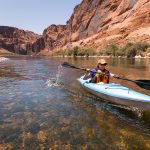DEI webinar series: Grappling with Unconscious Bias for More Inclusive Water Protection & Restoration (part 2 of 2) – 6/1/2017
This interactive 90-minute webinar is the second in a 2-part series and builds on the first session (recorded HERE). Session 2 explores the concept of unconscious bias and how it prevents us from doing our best diversity, equity, and inclusion work.
The presenters examine bias through three lenses: (1) our individual thoughts and actions; (2) within our organizational policies, practices, procedures, and programs; (3) in the water conservation and environmental sectors. For each lens, presenters provide examples of how bias manifests and ways to mitigate it. Participants are introduced to a framework they can use to begin exploring unconscious bias as well as some tips on how to begin mitigating and interrupting bias.
This 2-part DEI webinar series is designed to support local river and watershed organizations wrestling with the question of how they can become more diverse organizations working toward more inclusive and equitable solutions to their water challenges. Our work to protect and restore the rivers and other waters exists within the context of a society that is increasingly diverse. Nearly 40% of the U.S. population are people of color, and predictions suggest that by the mid-2040s non-whites and people of mixed-race will be a majority of our population. To remain socially relevant, River Network believes that our organizations should reflect the diversity of society as a whole, requiring us to both reform our institutions from the inside and our approach to our river protection and restoration work. Further, threats to water affect vulnerable communities the most, and yet they are seen and heard from the least in our water conservation community. Being an effective advocate for the rights of nature must include being an effective advocate for the human right to water and ensuring that we are working toward outcomes that are equitable to all members of our communities.
This webinar was presented by the Avarna Group and sponsored by the Urban Waters Learning Network and the Kresge Foundation.





